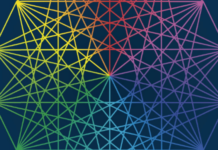The Aquarian Age is allegedly upon us, despite what actual astrological events indicate. One of the hallmarks of the New Age is said to be a shift in consciousness, from a materialist mindset to a more spiritually evolved one. This leave an unasked question: evolved from and to what? How does the spirit evolve, what will it ultimately become? Unfortunately, the basic assumptions underlying that question are flawed, and the real question remains unasked: why does the spirit need to evolve?
Evolution is a process of change. Scientists seeking to categorize forms of life did so by grouping life forms according to similarities in physical structure. It was noticed that many of these similar structures seemed to be related to simpler life forms that had more primitive versions of these structures. Eventually, a theory was established that all forms of life had originated from a common ancestor, with small variations in form compounding into massive changes between widely divergent species. Evolution was established and widely accepted as fact, well before Charles Darwin developed a working theory of natural selection, which allowed this process to take place.
Unfortunately, evolution is commonly misunderstood. People refer to evolution as a progression from a simple form to a more advanced form, and this implies that evolution has a sort of progressive component to it. Evolution connotes no such progression – it is change, pure and simple, and that change can just as easily result in a less complex form as it can a more complex form. We tend to ignore that fact in popular understanding, and evolution takes on an implication of upward progress, toward an inevitable ultimate achievement. Some view this pinnacle as man, the culmination of millions of years of evolution into an intelligent and self-aware organism capable of creating advanced technology. Others view this progression in spiritual terms, believing that the human spirit is destined to evolve upwards until it reaches God.
Okay, so I may be putting it in melodramatic terms, but the implication is still the same. The progressive error leads many to assume that the human spirit must develop into higher forms of expression, whatever that means. Also implied by this mindset is the desire to get away from, or do away with, lower forms of expression, and this can be further extrapolated into some kind of hierarchy of consciousness, with evil at the bottom and enlightenment somewhere towards the top.
The lower levels of consciousness are the realms of basic human survival and desire. People operating on this level are concerned primarily with their own survival, and to a certain degree the survival of others in their group. Happiness becomes a full belly, a warm place to sleep, and a sex partner (preferably a willing one). As one rises in consciousness, these concerns become more complex and more abstract. For example, the desire to satisfy hunger begins to manifest as securing an adequate food supply, which progresses to a desire to control a territory. Conflicts over resources have the potential to get more dangerous as they get more complex, but they also satisfy the needs of more individuals.
The higher levels of consciousness relate to more selfless concerns that impact larger numbers of people. Instead of concern for an individual, or a small local group, a person with a higher consciousness would be more likely to express interest for humanity in general, or all life on the planet. Goals and ideals become more abstract, and a shift of focus from competition to cooperation takes place. Those who reach the highest levels of consciousness achieve enlightenment, and express a love of and concern for all living things, and a desire to help others raise their consciousness to achieve enlightenment as well. Some evolution-minded people have the end goal of an enlightened utopia, a perfect society where everyone is united in enlightenment and mutual love and respect.
Enlightenment seems like an ideal goal, and it certainly seems that some states of mind are more advanced and desirable than others. Unfortunately, enlightenment can also take on a kind of status, and the existence of a hierarchy of consciousness can lead to a considerable amount of elitism. This can be doubly insulting when those openly proclaiming their enlightenment seem to be little more than serial regurgitators of positive thinking philosophy that missed the lecture on humility.
The glamour of higher consciousness can also lead those seeking to lift their own consciousness, or to raise the consciousness of others, to show disdain for those who do not share their concerns or wishes with regard to enlightenment or consciousness-raising. People who are comfortable with who they are, or who support social or political conventions that do not reflect a higher consciousness, can be met with ridicule or scorn. Blame can also be levied against those not concerned with raising their consciousness, as in many cases the problems of society are held to be the result of the influence of lower consciousness. Some of those seeking to raise the collective consciousness of humanity decide to do so by proselytizing, aggressively confronting others with their belief that only a shift in consciousness on a world-wide scale can save the planet.
Consciousness-raising is also quite a lucrative business. Numerous classes, lectures, and workshops aim at teaching others how to follow their inner bliss and raise their consciousness to near-divine levels. For a nominal fee, of course. Hundreds of self-help books feature inspirational stories and meditations designed to aide in this transition to higher consciousness. Also for a nominal fee. Gurus and enlightened masters can command substantial salaries in their selfless quests to help other achieve the enlightenment they have already attained. Unfortunately for many seekers, no matter how much money they spend on such workshops and tomes, enlightenment still evades them.
Now don’t get me wrong – I really do think that enlightenment is a noble goal. I also think that it is a difficult, arduous, and rarely successful travail that is certainly not for everyone. I also believe that the connection to the divine that enlightenment represents is not the culmination of some grand evolutionary scheme, but just that: a connection to the divine. Likewise, having high ideals and global concerns is wonderful, but to make it truly effective it requires a degree of personal detachment that most of us are not very capable of, and it is unfair to ask more of people then they are able to give.
Most people will demonstrate some or most of the qualities of higher consciousness if their basic needs are fulfilled. Similarly, most people who eschew material concerns due to their higher consciousness will fight just as savagely as anyone else to protect their children. I don’t see how this demonstrates a state of consciousness that is particularly higher or lower on some kind of arbitrary scale. Instead, it seems to me that it is more of a reflection of what kind of issues people are able to concern themselves with once their own needs are met. A person who is concerned about spreading love to people across the world in order to bring about World Peace is probably pretty sure that he will eat that evening.
Most importantly, I don’t see why the spirit needs to progress. It seems that the human spirit, like most things, has great capacity for good or evil, but having the potential for both is an essential part of its nature. Sure, the spirit may evolve as humanity does, but there is no reason to assume that such changes will necessarily be positive, or even negative for that matter. The experience of humanity includes both the best and the worst, and if the gods had wanted us any other way, they would have made us as such. Personally, I’m not one to want to mess with the work of the gods too much.
Copyright 2007, 2009 Chirotus Infinitumhttp://www.blacklightmetaphysics.comFirst published on the Witches’ Voice in 2007. Reprinted with permission from the author.Image credit: Nick Saltmarsh.








